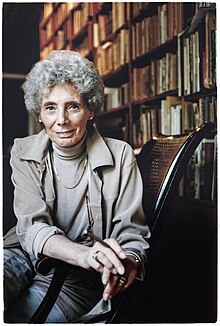Jacqueline Harpman
You can help expand this article with text translated from the corresponding article in French. (June 2018) Click [show] for important translation instructions.
|
Jacqueline Harpman | |
|---|---|
 | |
| Born | 5 July 1929 Etterbeek, Brussels, Belgium |
| Died | 24 May 2012 (aged 82) Uccle, Belgium |
| Nationality | Belgian |
| Citizenship | French, Belgian |
| Occupation(s) | Writer, psychoanalyst |
| Spouse | Émile Degelin (1953-1962) |
Jacqueline Harpman (5 July 1929 – 24 May 2012)[1] was a Belgian writer who wrote in French.
Biography
[edit]Jacqueline Harpman was born on 5 July 1929, in Etterbeek, Belgium, to Jeanne Honorez and Andries Harpman, exporters of Belgian fabrics and lace to North African colonies. She was the second daughter born to the couple after her sister Andrée, nine years her senior. Her father being a Dutch-born Jew, Harpman's family fled to Casablanca, Morocco when the Nazis invaded during World War II and they did not return to Belgium until the war had ended in 1945.[2] A large part of her paternal family was killed at Auschwitz.
After studying French literature, Harpman began training to become a doctor but could not complete her studies as she contracted tuberculosis. She began writing in 1954 and her first work, L'Amour et l'acacia, was published in 1958. In 1980, she qualified as a psychoanalyst. I Who Have Never Known Men was her first book to be published in English, and was originally published with the title The Mistress of Silence.
Harpman continued to write and work as a psychoanalyst until her death. She died on 24 May 2012, in Brussels, Belgium, after having been severely ill for a long time. She was 82.
Upon her death, her archives were given to the Archives et Musée de la Littérature in Brussels, where archivists rebuilt her writing desk.
Personal life
[edit]Harpman was married to Belgian filmmaker Émile Degelin from 1953 to 1962. She had two daughters, Marianne and Toinon, and four grandchildren.
Honors
[edit]- In 2019, an avenue in Brussels was named after her in acknowledgement of her works.[3]
- On 5 July 2024 the Google Doodle was dedicated to Jacqueline Harpman.
Works
[edit]- L'Amour et l'acacia – 1958
- Brève Arcadie – 1959 (winner of the Prix Rossel) [1]
- L'Apparition des esprits – 1960
- Les Bons Sauvages – 1966
- La Mémoire trouble – 1987
- La Fille démantelée – 1990
- La Plage d'Ostende – 1991
- La Lucarne – 1992
- Le Bonheur dans le crime – 1994
- Moi qui n'ai pas connu les hommes – 1995
- Orlanda – 1996 (winner of the Prix Médicis)[2] [3]
- L'Orage rompu – 1998
- Dieu et moi – 1999
- Récit de la dernière année – 2000
- Le véritable amour – 2000
- La vieille dame et moi – 2001
- En quarantine – 2001
- La Dormition des amants – 2002
- Le Passage des éphémères – 2003
- En toute impunité – 2006
References
[edit]- ^ Jacqueline Harpman est décédée, LaLibre, 24 May 2012
- ^ "Qui est Jacqueline Harpman, cet écrivaine belge mise à l'honneur sur la page d'accueil de Google ?". La DH Les Sports+ (in French). 5 July 2024. Retrieved 3 February 2025.
{{cite web}}: CS1 maint: url-status (link) - ^ Times, The Brussels. "Four iconic Brussels residents now have streets to their names". www.brusselstimes.com. Retrieved 9 January 2023.
